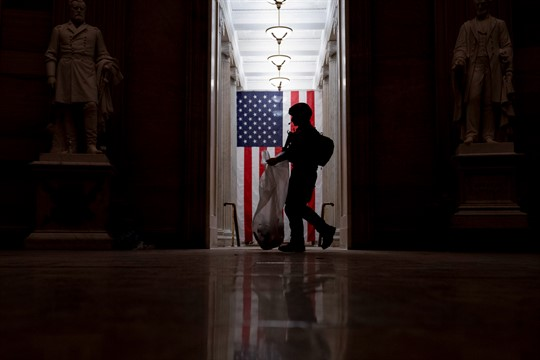
If the events in Washington, D.C., yesterday demonstrate one thing, it is this: Words have power. Donald Trump used them to incite a mob, and that mob then attacked the U.S. Capitol building to disrupt the congressional certification of the presidential election results taking place there. That incitement by Trump—and the speakers who preceded and followed him at a rally of his supporters earlier yesterday—was not even veiled.
It followed months now of similar incitement, a concerted campaign of lies and fabulations that sought to replace the reality of Trump’s defeat with feverish fantasies of stolen victory. As those fantasies took hold among Trump’s political base, the initial awkward discomfort felt by Trump’s Republican enablers in Congress gradually shifted. What began as arms-reach indulgence of Trump’s fragile, narcissistic ego soon became a wholehearted embrace of his attempt to overturn the will of the American people and the laws that govern their elections.
What happened yesterday represents the sad, predictable outcome of that campaign. Because words have power, it is important to put the proper name to it: insurrection. More precisely, and importantly, it is Trump’s insurrection, as he is responsible for fomenting and directing it.
But because words have power, it is also important, in taking the proper measure of what took place yesterday, not to give those events more meaning and power than they deserve. A mob storming the Capitol is shocking and, for most Americans, deeply embarrassing.
But the mob that did so yesterday was fundamentally weak. It could have been, and should have been, easily turned back by the Capitol Police. The failure to do so transformed what initially looked like a comical, live-action, role-playing game out on the National Mall into a shocking spectacle that made headlines around the world.
Even so, though the mob’s actions were insurrectionary, it was only able to accomplish two things: to disrupt and to desecrate. The disruption was short-lived, and it did not prevent the certification of the election, nor will it prevent the transfer of power to President-elect Joe Biden.
The intent to desecrate—evident in the photo trophies the insurrectionists took of themselves on the Senate floor and in various congressional offices, as well as the vandalism and the looting they carried out—was perhaps as unsettling, if not more so.
In recognizing that American democracy is not invulnerable, it is also incumbent on its defenders to recognize that it isn’t now, nor has it ever been, infallible.Here, it is important to remember that desecrations, though deeply wounding, can also be salutary and instructive, if they cause us to reaffirm the value and significance of what has been desecrated. That is because altars and temples are only ever material edifices. If they are invested with sacred meaning, it is through the sublimating effect of the offices and rituals that take place within them. But it is a mistake to confuse the pomp and circumstance of ceremony for what is sacred in that ceremony.
The Capitol can and will be reconsecrated through the function of republican government. In reconvening to formally count the Electoral College votes following the disruption, Congress has already taken the first step to doing so.
Though this mob was able to roam and vandalize the halls and walls of the Capitol, it was and is too inconsequential to threaten the republic that the building symbolizes. The same cannot be said for those who fed the mob’s grievances and incited it to act. If the insurrectionists who stormed the Capitol are to be held accountable for the laws they violated, as they must be, then every last one of the elected representatives who incited and encouraged them to do so should be as well—beginning with Trump, who should be removed from office immediately.
To say that American democracy can and will withstand this attempt to subvert it is not to be blind to the threats it faces. And in recognizing that American democracy is not invulnerable, it is also incumbent on its defenders to recognize that it isn’t now, nor has it ever been, infallible. For the greater part of America’s history, its democracy has excluded Americans as much as it has represented them.
But that history is also one of consistent improvement, redress and progress that, though uneven, too slow and never adequate, has offered every generation of Americans greater and more inclusive representation than it did to those that came before.
Most importantly, American democracy has always proven to be resilient. But it will only remain so if there are enough people who believe that, for all its very real flaws and shortcomings, it is worth not only defending, but also improving. The outcome of November’s presidential election, as well as the Democratic sweep of Georgia’s Senate runoffs that were also held this week, suggest that is the case.
As shocking as yesterday’s events were, they should be recognized for what they truly represent: the last, desperate attempt by Trump and his mob, both outside of Congress and within it, to replace reality with fantasy.
Words have power. Trump’s insurrection failed. American democracy didn’t.
 Eurasia Press & News
Eurasia Press & News


